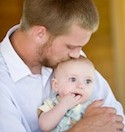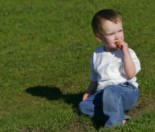In my opinion growing great families comes down to communication and giving the small people space. From that comes trust, respect, a sense of being heard, being important and of being loved.
There’s no one who would doubt that fresh air, clean water, and healthy food are all essential. However, I believe that effective communication is the key to health and well being – creating the space for a great family to grow.
Are you listening to your baby?
People often call me a Baby Whisperer. When that happens I usually have to stop and take a breath because it is a compliment, but also because I know I feel the need to then say, “kind of, but I prefer Baby Listener”.
I then go on to explain what I believe I do is to create a space for communication between myself and the baby. This helps guide that baby into a rhythm that works for the whole family. This usually will result in the baby eating well and sleeping through the night from an early age. But that’s another story…
Effective communication starts from birth
So, for argument’s sake, I will say that communication starts from birth. I say it like this because I’m currently reading The Secret Life of the Unborn Child, A remarkable and controversial look at life before birth, which goes even further. It’s a fascinating read about how there is possibly at some level, emotional awareness and communication before birth… but I digress.
STOP, LISTEN and OBSERVE
The key to effectively communicating with your baby is this: stop, listen and observe.
Stop – your inner dialogue, Listen – to the sounds she is making, and Observe – what is her body language and behaviour telling you?
And then what does your gut tell you in relation to all of that?
Many people listen to the books they’ve read, or the internet pages they’ve trawled, and not to the real life baby in front of them. We’re told that babies are programmed to cry to let you know when she needs something, eg food, sleep, nappy change, and comfort, among other things.
But my question to you is what was she saying before she started crying?
There are books out there that you could find to help you to match the correct noise or jerky movements to needing sleep or food, but I implore you to figure it out with your baby, not from the books. This will start the effective communication I’m referring to that starts from when they’re born, and will set you up for great communication, quite possibly forever.
Here’s the thing about books, I’ve been working with babies and children for over 19 years. I would be hard pressed to tell you a specific noise babies make when they’re hungry, body language and behaviours, yes, but noises, not so much.
Give me a day or two with a specific baby or child and I can tell you what that individual is trying to say. Sometimes I see it as a failing on my part that I don’t have a “theory” to match my knowledge… and then other times I think it’s really great that I use my instinct and “listening” skills to interpret what’s going on.
Funnily enough I find writing articles a challenge as I have to put into words things that I just do, usually without thinking. When I’m in a position where I’m helping to get a family on track, I have to really think about what it is that I’m doing, so that I can explain it to the parents so they understand and can follow on with the subtle changes I’m making.
Honesty is the best policy
I speak to babies as if they understand what is happening and going on.
If I’m putting them to bed and someone else is getting them up. I tell them. I ask them if they want to be picked up, if they’re hungry, if they’re upset, and often they calm down quicker if it is acknowledged.
It might sound weird, but I find it to be true.
If they’re about to get their vaccinations for example, I tell them it will probably hurt and that I’ll give them a big cuddle and then we can go home, or whatever else is appropriate. I acknowledge their pain from it, and tell them I think they’re very brave. I hold eye contact if they’re willing and sit with them in their discomfort.
I do the same with children too when they’re angry or upset. Sometimes no words are required and sometimes a monologue is just what they need, until a dialogue can be established. This goes for baby or child (or most adults too for that matter).
Some Space in time
Following on from this, giving babies “space” is also as important as it is part of the communication.
Sometimes they just need a little time to themselves.
I’ve talked about flow in a previous article about when you get so engrossed in something, time is of no consequence, it seems to disappear, you feel fulfilled, there is no boredom.
Babies need time for this also. They need time to figure themselves out. The easiest example is when they turn their heads away from you or the toy/stimulation. When they do that, they have had enough. I will further explain using some examples of communication and space from a little girl I have recently been guiding to get on track.
An example on communication
Lily is a lovely, sweet natured little girl, who has big blue eyes that can smile without her mouth moving. I came to help her when she was 13 weeks old because she presented with reflux, and she wasn’t eating well, she wasn’t gaining weight. Her mum knew instinctively that things were not right, so called on my services.
My belief is that a baby wants to eat and sleep, and if they aren’t there is something in the way, something stopping them from achieving a good eating and sleeping balance.
My advice was to see a Pediatrician to get the reflux under control, this took some time to get the medication right, so it was up to her mum and dad and I to learn to communicate with her so that we could cajole her to eat.
Babies have a tendency to go into their own little world when they are overwhelmed (this usually looks like crying with their eyes closed) and it can be tricky to pull them back out, to make eye contact and reconnect.
Lily’s feeding was extraordinarily difficult – we are talking walking around for the entire feed for her to take an hour to drink 80 mls in the first couple of weeks sometimes taking no more than 400 mls a day.
started to try to coax her out of her pain bubble by singing Twinkle Twinkle Little Star, her big blue eyes would widen and she would soon quiet down, whether or not she took any more milk was almost irrelevant, we were communicating, she got that I heard her (incidentally, her mum instinctively chose a monologue of conversation that allowed Lily to reconnect to her).
Eventually, we got the medication that was right for Lily (now 5 months) and on the whole she is comfortably drinking now, and heartily eating her solids (on medical advice).
There have been a few feeds recently where she has struggled to settle into them, and so I go back to the basics, and I find it amazing that as soon as I start to sing Twinkle Twinkle to her, she immediately stops crying, and looks right into my eyes, we reconnect and then I talk to her and reassure her that everything is ok.
She immediately relaxes and after a few moments and sometimes a burp, she will carry on with the feed without any trouble. She is now regularly taking around 800 mls a day. (I might just add that there were a lot of very frustrating feeds, numerous hurdles and some complications along the way – it has not been plain sailing by any stretch of the imagination, I’ve merely simplified it to make the point about communication)
Lily is a classic example of how easily effective communication can work. She is responsive, alert and happy and certainly lets everyone know what works and doesn’t work for her.
Take this afternoon’s feed with her mum, she didn’t want the milk first, she wanted the solids, we could hear the milk hitting the sides as it went down causing her discomfort, so solids it was. Does it matter that it changes occasionally? No it really doesn’t. But by listening to her individual needs and not forcing any set rules on her because that is what is in our adult heads, she knows that she is being heard.
Are you listening?
We need to listen to our children. We need to hear them so that later on in life as they grow, they can hear what we have to say. It is a 2 way thing! Communication is the key, it is the way forward for growing GREAT families and what’s more, growing GREAT individual people within those families.
For more expert advice from some of New Zealand’s top baby experts, check out our Babies section.






